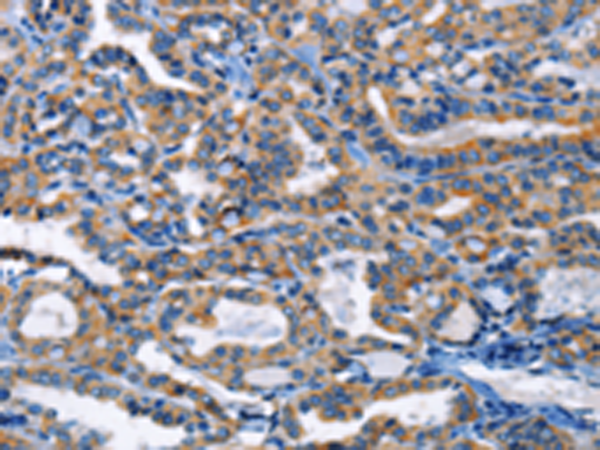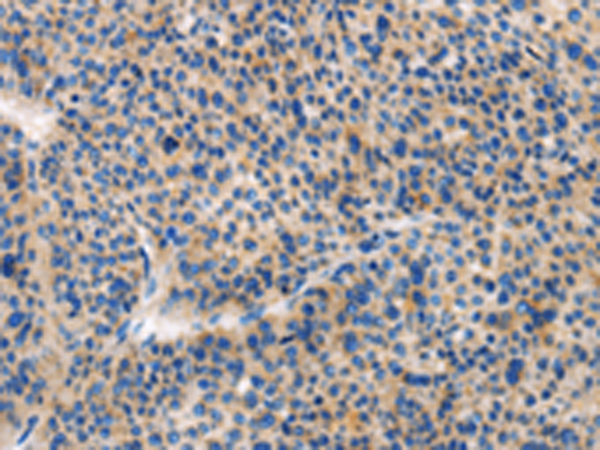


| WB | 咨询技术 | Human,Mouse,Rat |
| IF | 咨询技术 | Human,Mouse,Rat |
| IHC | 1/25-1/100 | Human,Mouse,Rat |
| ICC | 技术咨询 | Human,Mouse,Rat |
| FCM | 咨询技术 | Human,Mouse,Rat |
| Elisa | 1/2000-1/5000 | Human,Mouse,Rat |
| Aliases | JTK9; p59Hck; p61Hck |
| WB Predicted band size | 60 kDa |
| Host/Isotype | Rabbit IgG |
| Antibody Type | Primary antibody |
| Storage | Store at 4°C short term. Aliquot and store at -20°C long term. Avoid freeze/thaw cycles. |
| Species Reactivity | Human, Mouse, Rat |
| Immunogen | Fusion protein of human HCK |
| Formulation | Purified antibody in PBS with 0.05% sodium azide and 50% glycerol. |
+ +
以下是关于HCK抗体的3篇代表性文献,按研究方向和摘要内容分类整理:
---
### 1. **文献名称**:*"HCK is a potential therapeutic target for chronic lymphocytic leukemia"*
**作者**:Ponader et al. (2012)
**摘要**:
本研究揭示了HCK激酶在慢性淋巴细胞白血病(CLL)中的异常激活及其促存活功能。通过使用特异性HCK抗体和小分子抑制剂,作者证实抑制HCK可诱导CLL细胞凋亡,提示HCK可能成为CLL治疗的潜在靶点。
---
### 2. **文献名称**:*"Role of HCK in myeloid cell inflammatory signaling and its implications for Alzheimer’s disease"*
**作者**:Ulrich et al. (2018)
**摘要**:
该研究利用HCK基因敲除小鼠和抗HCK抗体,发现HCK通过调控小胶质细胞的炎症反应参与阿尔茨海默病进展。抑制HCK可减少神经炎症和淀粉样斑块沉积,为神经退行性疾病治疗提供新思路。
---
### 3. **文献名称**:*"Development of a high-affinity anti-HCK monoclonal antibody for functional studies in hematological malignancies"*
**作者**:Chen et al. (2020)
**摘要**:
研究团队开发了一种高亲和力抗HCK单克隆抗体,并通过流式细胞术和免疫印迹验证其特异性。该抗体成功用于检测急性髓系白血病(AML)患者样本中HCK的过表达,为血液肿瘤诊断和机制研究提供工具。
---
### 扩展方向建议:
- **临床转化**:HCK抑制剂与现有化疗药物的联用效果(如2021年*Blood*期刊相关研究)。
- **技术应用**:基于HCK抗体的免疫组化在实体瘤微环境分析中的应用(可参考2023年*Nature Cancer*论文)。
如需特定方向的文献或全文链接,可进一步补充说明。
HCK (Hematopoietic Cell Kinase) is a member of the Src family of tyrosine kinases, primarily expressed in hematopoietic cells, including myeloid cells, B lymphocytes, and natural killer cells. It plays a critical role in immune cell signaling, regulating processes like phagocytosis, cytokine production, and cell differentiation. HCK is activated by interactions with cell surface receptors (e.g., integrins, Fc receptors) and downstream signaling molecules, influencing pathways such as PI3K/AKT and MAPK. Dysregulation of HCK has been linked to hematological malignancies, chronic inflammation, and autoimmune disorders.
HCK antibodies are essential tools for studying its expression, activation, and functional roles. They enable detection of HCK in immunoblotting, immunohistochemistry, and flow cytometry, aiding research into its involvement in diseases like leukemia and rheumatoid arthritis. Therapeutic strategies targeting HCK, including inhibitory antibodies or small-molecule inhibitors, are under exploration to modulate aberrant immune responses or oncogenic signaling. Recent studies also highlight HCK's dual role in tumor microenvironments, acting as both a promoter of cancer progression and a mediator of anti-tumor immunity, making it a nuanced target for precision therapies.
×